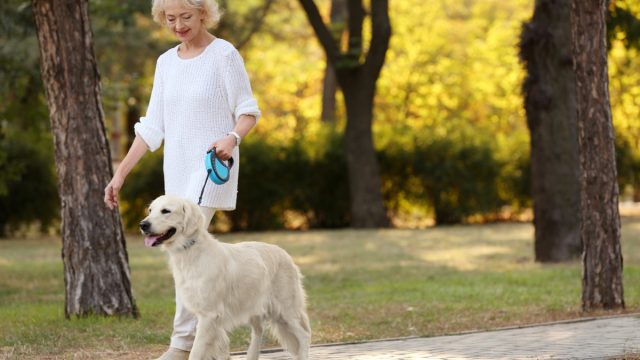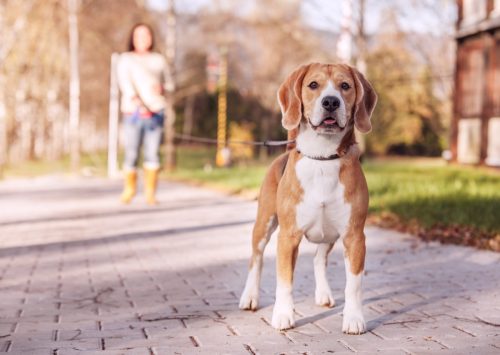If Your Dog Is Doing This on Walks, Call Your Vet Immediately

Our dogs are not just pets—they’re family. Your loyal Labrador or feisty French Bulldog is an integral part of daily life, offering comfort, companionship, and sometimes a good laugh. But while we’re able to train our dogs to respond to commands, they struggle to communicate back when something is amiss—which is why you should always be on the lookout for warning signs. According to experts, if your dog is exhibiting a certain behavior on walks, you need to contact your veterinarian immediately. Read on to find out what symptom to pay attention to.
READ THIS NEXT: If Your Dog Is Playing With This, Take it Away Immediately.
Dogs have different habits and behavioral styles.

Part of the fun of owning a dog is getting used to their individual personalities. Dogs can be shy and nervous or prefer to be pet by every passerby. Your pup could also have different habits that seem odd—including circling before lying down or kicking their feet after doing their business. These tendencies might seem strange, but they’re common and not a cause for concern.
Abnormal behaviors, on the other hand, are something you’ll want to address head-on, and there’s one that vets warn is particularly worrisome.
Take note of this the next time you take your dog on a walk.

Aside from exercise, taking your dog for a walk has one (or two) main objectives—allowing them to go to the bathroom. But if your pup is struggling to urinate, it could be a real cause for concern.
“Regardless of age, breed, or sex, a dog should never have trouble passing urine,” Linda Simon, MVB, MRCVS, veterinary surgeon and veterinary consultant for FiveBarks, says.
Some intact male dogs (those who haven’t been neutered) may continue to lift their leg to pee, even if they don’t have to go, Simon says, but this is part of “normal scenting behavior.” But if your dog is consistently trying to urinate and small amounts or no pee is coming out, there could be a more serious issue at play. In these instances, your dog may also show signs of distress and breathe more heavily.
“Any time a dog is struggling to urinate should ring alarm bells,” Simon adds. “An urgent vet visit is needed so we can check the dog over, assess their bladder, and analyze their urine.”
For more pet content delivered straight to your inbox, sign up for our daily newsletter.
It could be a sign of different health problems.

According to Simon, an inability to urinate on a walk could signal different medical conditions, such as bladder stones, an enlarged prostate, or a bladder mass.
“All of these things can physically block urine,” she said. “The danger here is that urine builds up in the bladder and dogs can experience a bladder rupture and kidney failure.”
Additionally, your dog could have an inflamed bladder, formally known as cystitis, or a urinary tract infection (yes, dogs get UTIs too). Associated symptoms of these medical issues include cloudy or bloody urine, decreased appetite, a sore or bloated abdomen, general pain or discomfort, and lethargy, experts say.
These issues are not likely to go away on their own, requiring professional treatment following diagnosis. “Please do not ‘wait to see if it passes,’ and do not medicate without a veterinarian’s prescription,” Paola Cuevas, MVZ, behaviorist with Petkeen.com, cautions. “Follow your veterinarian’s recommendations and keep a close eye on your dog during and after the treatment.”
Your dog could also be experiencing some anxiety.

According to David Littlejohn, DVM, lead veterinarian at Pawscessories, there may be another reason that your dog is struggling to pee when on walks that’s not as serious. “There’s also the possibility that it’s more psychological and related to anxiety, which is causing them to have difficulties urinating normally,” Littlejohn says.
However, vets still recommend getting your dog checked out whenever they experience these kinds of issues, as not urinating is abnormal and your pup could be in serious pain.
“Any time you notice any differences in your dog’s ability to urinate, the frequency, or any changes in urine appearance, see your veterinarian,” Chyrle Bonk, DVM, a veterinarian with Hepper.com, stresses. “If your dog isn’t able to pass any urine within a four to six-hour period, is straining to do so, or is showing any other signs of discomfort, see your vet immediately.”
READ THIS NEXT: This Is the Least Popular Dog Breed in the U.S., Data Shows.